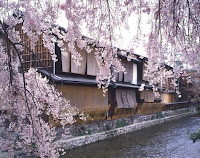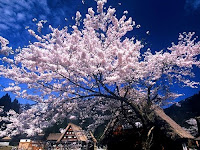
We are an independent travel company offering the very best in travel planning for people and businesses going to Japan. Our services range from Self-Guided & Tailor-Made Japan Tours to a more hassle free and fully led Small Group Japan Tour. Most of our Japan itineraries include the Japan Rail Pass as well as a combination of traditional ryokans and stylish affordable accommodation options.
Friday 25 March 2011
Tsunami North-East Japan March 2011
One should not assume on this evidence that the Japanese are a docile people. Japan for a century and a half at least has been a relatively egalitarian society. As a result, if an underlying sense of justice is offended, acquiescence cannot be taken for granted. The rice or food riots in 1918 or in 1787 show that people can in fact protest with violence (and in a lesser matter the ferocity of protests against the extension of runways at Narita airport thirty years or more ago springs readily to mind). In the handling of pre-1868 rural unrest, the sense of fair play was often in evidence. Ringleaders were punished, but officials often removed from office as authors of the discontent which led people to rise.
When Japan opened to the outside world in 1858, outsiders immediately observed the universal good order, freedom from crime and cleanliness. What is the origin of these qualities is harder to say. Confucian beliefs (but only among elites) to some extent and more pervasively Buddhist traditions may have contributed. But the same beliefs and traditions were not sufficient in neighboring counties to produce societies as orderly.
The remarkable and pervasive punctuality, with its implied consideration for others, is one of the results. Service workers will unfailingly keep appointments and come on time. In daily life these qualities make life easier for everyone. They become an even greater asset in a crisis like the present.
Commitment to duty has meant that in war time Japanese troops tended to fight to the last man, and in 1941-5 prisoners were numerous only in the very last stages, The rule of thumb in the west is that if losses exceed a third, even very good troops are ready to surrender. In reverse, as prisoners of war Japanese, pragmatically choosing to make the best of their bad fortune, cooperated loyally with their captors. As prisoners of war, westerners on the other hand were frequently obstructive and uncooperative, making life more difficult for themselves as well as for their captors.
These qualities, so beneficial in daily life, can however result in a rigid and unimaginative exercise of duties when officials take them to heart. At the outset of the big snow falls in Tokyo in January 1998 dozens of crowded evening commuter trains were thoughtlessly allowed to proceed and finally to end up marooned for 10 hours as signals universally turned to red. In the Kobe earthquake one customs official famously sought to quarantine the sniffer dogs a Swiss rescue team brought with them. Foreigners were less than impressed in the first days by evidence of routine observation of duties rather than an exercise of imitative and a sense of urgency to save lives.
A very real weakness of Japanese officialdom is overconfidence in their own organization and methods. Officials visiting California after the January 1994 earthquake there concluded that the same destruction could not occur in Japan. It did and the Kobe earthquake exactly a year later was devastating. Officialdom was unprepared for it . Apart from their misplaced confidence in the durability of new buildings and especially infrastructure , the rescue operation was shambolic because the demands had been entirely unforeseen.
The key failure in 1995 was that the cabinet in Tokyo had not the courage to call in the armed forces ( the Self Defence Forces) through respect for the constitutional requirements intended to keep the army in the background. Food, blankets and water were slow to reach the victims. One can hardly take pride in a natural dissster. But the tsunami in March has shown Japan at its best, the people cooperative and orderly , and the army and other rescue forces acting with the efficiency of which Japan is in fact supremely capable.
L.M. Cullen
Tuesday 22 March 2011
Sakura Time Approaching
 It's getting closer and closer to the cherry blossom season in Japan. Not forgetting about last weeks horrific tsunami and constant reminder of the thousands of people who have lost their lives, it is up to us to keep reminding the world how beautiful a country Japan is and how dignified and elegant the Japanese people are. Here are a few photo's of what to expect in the coming weeks. The cherry trees (sakura) will start to bloom in the south of Japan working their way up to the north - hopefully adding some hope and happiness to those left without homes.
It's getting closer and closer to the cherry blossom season in Japan. Not forgetting about last weeks horrific tsunami and constant reminder of the thousands of people who have lost their lives, it is up to us to keep reminding the world how beautiful a country Japan is and how dignified and elegant the Japanese people are. Here are a few photo's of what to expect in the coming weeks. The cherry trees (sakura) will start to bloom in the south of Japan working their way up to the north - hopefully adding some hope and happiness to those left without homes.

Monday 21 March 2011
Official Travel News Update
Saturday 19 March 2011
Thinking of canceling your trip to Japan because of earthquake?

Friday 18 March 2011
Tohoku Earthquake Appeal
Here at Unique Japan Tours we are devastated by the recent earthquake, subsequent tsunami, and now nuclear power plant problems the Japanese are experiencing. We are doing our best to accommodate all of our passengers and thankfully, none of our staff, family, friends, or customers have been directly affected by any of these hugely unpredictable and unprecendented activities.
We would like to bring your attention to the Ireland Japan Association - Earthquake Appeal fund that UJT has been involved in setting up. To make a donation, that will ultimately be sent directly to the people who need it most in the affected areas on the north east coast: Visit www.ija.ie